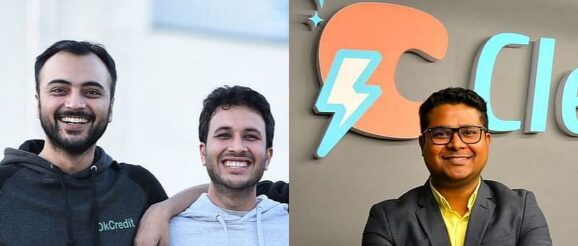How IIT leads in encouraging research and innovation among SMBs and other top stories of the week

This week, SMBStory’s top picks include Clensta, an IIT-Delhi incubated brand that helps soldiers, patients maintain personal hygiene with its waterless products, and OkCredit, founded by three IIT graduates. It is a free business accounting app that has over 5.5 million MSMEs on its platform.
Harsh Pokharna, Gaurav Kumar, and Aditya Prasad, Co-founders of OkCredit
If the COVID-19 pandemic and the lockdown has taught Indian MSMEs anything, it is that digital, contactless payments are here to stay. This comes in wake of the need to record and account monetary transactions digitally.
Bengaluru-based startup OkCredit’s founders may not have predicted the pandemic in 2017, but they were willing to place their faith in building mobile-based digital accounting solutions for MSMEs.
Frequently interacting with local grocery stores, IIT Kanpur graduates Harsh Pokharna, Gaurav Kumar, and Aditya Prasad noticed shopkeepers would do most of their accounting on paper. Tallying took long, the process was prone to human error, and the small slips of paper could be easily misplaced.
This led them to launch OkCredit – a free, digital-based credit balance recording solution for small business owners in 2017.
It has 5.5 million active users and saw transactions worth $7.5 billion recorded in October 2020.
Founder and CEO, Puneet Gupta, Clensta
Puneet Gupta, sales and marketing graduate from IIM Calcutta started his career with the US-based technology and manufacturing company Honeywell. Fascinated by the growth of the Indian startup ecosystem during the last decade, he decided to leave his well-paying job at the US-based MNC to work with Indian startups, specifically catering to the defence sector.
The challenge of not being able to maintain personal hygiene (like not bathing for days) led Puneet to develop waterless technology products in 2016 under the brand name Clensta.
In an interaction with SMBStory, Puneet Gupta, Founder and CEO, Clensta, says, “Starting up needs a strong idea but to sustain the business, an entrepreneur needs huge funds and infrastructure. To create innovative healthcare products, we needed a strong R&D, and thus, we joined hands with IIT Delhi to help us make hygiene accessible for anyone, anytime, and anywhere.”
While Puneet is the sole founder of Clensta, Prof (Dr) Anurag Rathore (Department of Chemical Engineering – IIT Delhi) serves as the Scientific Advisor for the brand.
Situated in IIT Delhi’s Biotechnology Business Incubation Facility, Clensta has developed a waterless body bath and shampoo that can be used by defence personnel, patients, elderlies, and adventure enthusiasts to take baths without water while maintaining proper hygiene.
For the same, it has developed a simple formulation devoid of alcohol, SLS, and any other harmful ingredients. These products can be directly applied to hair and body, massaged, and dried off using a towel, without any use of water.
Clensta has raised undisclosed angel investments for scaling its product and portfolio from shareholders and investors, including Sanjeev Jain, an IIT Delhi alum and a seasoned angel investor, and Indian Angel Network and its maiden VC fund – IAN Fund.
The Delhi-based company rakes in an annual turnover of Rs 3.5 crore.
Manav Singh. Chairman, Imperial Holding Group
Manav Singh, the Chairman of Imperial Holding Group, says he practically lived out of a suitcase for a few years after he returned to India from the US in 1996.
During his early years, with his never-say-no attitude, Manav went on to sell night gloss powder, non-CFC gases to refrigeration companies, and refrigeration oil, among others, before he chanced upon the aviation industry.
At present, Manav’s multi-billion-dollar Imperial Holding Group operates various businesses, including Aerostar Aviation (spare parts supplier), Imperial Air (air charter and air ambulance services), FarmX (ecommerce), and Imperial Realty (real estate).
Manav also introduced fractional ownership in India. Fractional ownership can mean owning half a plane or even one-tenth of a plane. So, people buy according to the number of hours a plane flies.
For example, if a plane flies for 1,000 hours, you can end up owning it for 100 hours. Additionally, if the plane costs Rs 100 crore, you only pay Rs 10 crore if you want to own one-tenth of the plane. This is beneficial because you own the plane only for the amount of time you want to fly in it.
The Delhi-headquartered company reports an annual turnover of over Rs 1,200 crore. The spare parts business contributes majorly clocking Rs 900 crore turnover annually.
